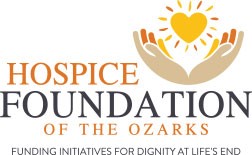
Frazzled & Fatigued, Flexed & Fulfilled: How Palliative Professionals Navigated Team Opportunities and Challenges During Covid-19 Webinar
Date & Time
June 16, 2021 @ 4:00 pm - 5:00 pm
Event Location
Event Details
June 16, 2021
4:00pm – 5:00pm Ct
Zoom
This free webinar series is supported by a generous grant from the Hospice Foundation of the Ozarks and the Foundation for Barnes-Jewish Hospital.
Speakers:
Hamish Seegers, APBCC-HPC, Chaplain – Hamish works as a professional Chaplain with BJC Home Health and Hospice. Hamish also serves as a Hospice educator in the Missouri Correctional Facilities teaching offenders how to provide hospice care to other offenders in need. He received his B.A. in Religion as well as a Masters in Religion from Olivet Nazarene University, a Master’s in Missional Leadership from Northwest Nazarene University, a Masters of Divinity in Chaplaincy from Olivet Nazarene University, Four Units of CPE from Rush University, and a Palliative Care Specialty Certificate from California State University. Hamish achieved a specialized Advanced Practice Board Certified Chaplain in Hospice and Palliative Care from the Spiritual Care Association. The Spiritual Care Association (SCA) is the first multidisciplinary, international professional membership association for spiritual care providers that establishes evidence-based quality indicators, scope of practice, and a knowledge base for spiritual care. Hamish has a vast experience, leadership, and wisdom in working with people, team development, and administration. Hamish works alongside others supporting those in need throughout his career as a chaplain and bereavement specialist. Hamish is an Ordained Elder and Ecclesiastical Endorsement with the Church of the Nazarene and in process of becoming an Air Force Chaplain Reservist. He resides in St. Charles with his wife and two children.
Christa Burke, MSW, LCSW, ACHP-SW, APHSW-C, Palliative Care Social Worker – Christa has a Master’s degree in Social Welfare from UCLA and is a Licensed Clinical Social Worker. She obtained Advanced Certification in Hospice and Palliative Care Social Work (ACHP-SW) in 2015. She has a broad background in social work but began medical social work as a Pediatric Oncology Social Worker at Dartmouth Hitchcock Medical Center in 2005. She transitioned to adult palliative care in 2015. Christa is currently a Palliative Care Social Worker with the Washington University Division of Palliative Medicine at Barnes-Jewish Hospital in St Louis, MO. Christa serves as the Social Work Consultant for the Missouri Hospice and Palliative Care Association (MHCPA) and is a member of NASW, SWHPN (Social Work Hospice and Palliative Care Network) and the St Louis Social Work Leaders in Healthcare organization. Through MHPCA, Christa serves as a Hospice educator for in Missouri Correctional Facilities teaching offenders to serve as hospice volunteers to other offenders in need. Christa is passionate about helping patients and their families cope with serious illness and encouraging meaningful discussions about the experiences and values that give meaning to a person’s life. She currently works on a dynamic interdisciplinary team in both an inpatient and outpatient setting focusing on the needs of the whole person. She enjoys teaching social work students, medical students, residents and fellows in addition to her direct patient care. She has recently published an article about her Palliative Care MSW Practicum Curriculum designed to educate future social work leaders in Palliative Care.
BRIAN D. CARPENTER, Ph.D. – Brian is a clinical psychologist whose occupational responsibilities and experience include teaching, research, and clinical work surrounding people with serious, life-limiting illness. Brian has been conducting research on communication interventions for several years, and have developed evidence-based tools to help providers, patients, and care partners talk about challenging medical scenarios. He has also provided training to interprofessional healthcare students and team members about effective communication strategies.
Overview & Objectives:
As the pandemic disrupted hospice and palliative care for patients and family members who depended on these services, so too did the crisis change how interprofessional teams needed to function within themselves. Team communication became more challenging. Interprofessional boundaries were stretched. And stress had the potential to chip away at team cohesion. Join this panel discussion as professionals from different disciplines share their perspective (and we hear yours) on the challenges and opportunities the pandemic presented and how teams are moving forward stronger. After attending this session, you’ll be able to:
1. Identify how COVID-19 disrupted the pragmatics of how palliative care teams operated;
2. Understand how COVID-19 introduced new opportunities and new tensions into how palliative care team members interacted with one another; and
3. Adopt practical strategies to enhance interprofessional palliative care team functioning post-COVID-19.
Webinar Information:
This webinar is FREE!
Please use your Medicare ID number for your membership number.
Registrants will receive the Zoom link and call in information the week of the training.
This is an intermediate level course.
No Nurse CE’s are provided for this training.
Social Worker CE’s are available at no charge.
No CME Credits are provided for this training.
This webinar will be recorded. The recording will not offer CE credits. If you are not able to attend on the day of the webinar, please register like you are attending and MHPCA will send you the recording. Please email crystal@missourihospice.org if you would like the recording.
Missouri Hospice and Palliative Care Association, #1359, is approved as a provider for social work continuing education by the Association of Social Work Boards (ASWB) www.aswb.org, through the Approved Continuing Education (ACE) program. Missouri Hospice and Palliative Care Association maintains responsibility for the program. ASWB Approval Period: 2/28/2020–2/28/2023. Social workers should contact their regulatory board to determine course approval for continuing education credits.
Social workers participating in this course will receive 1.0 continuing education clock hours.



